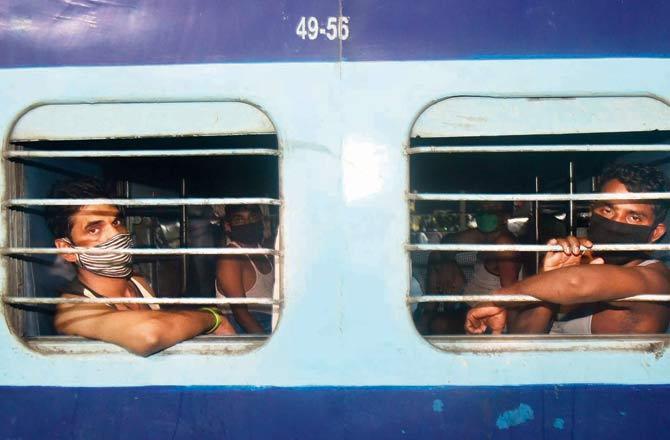As delayed trains leave scores hungry and desperate, mid-day finds out the back story

Migrants wait to board a Borivli Sharmik train. File pic/Ashish Raje
How does a train lose its way and take days instead of hours to reach its destination? This question has been on the minds of citizens after passengers stuck on Shramik Specials made videos saying the train driver had forgotten the route and lost his way.
ADVERTISEMENT
mid-day reached out to passengers, rail experts and those working at the backend for answers.
The Indian Railway clarified that the incidents happened only on May 23 and 24. It is practically not possible for a train driver to lose the way as they do not control the route. What has emerged is that trains simply had to be diverted due to a traffic jam on the route as most of the trains from across India were headed to one part of the country. With shortest routes being jammed, trains had to go through alternative routes. However, it led to problems of providing food and water to passengers at small stations.

Migrants on board a Shramik Special leaving for Gorakhpur from Bhiwandi. Pic/Suresh Karkera
The diversions
Western Railway's chief public relations officer Ravinder Bhakar was one of the first ones to issue a detailed clarification. According to Bhakar, the Vasai Road-Gorakhpur Shramik Special train, which departed May 21 was to run on the Kalyan-Jalgoan-Bhusaval-Khandwa-Itarsi-Jabalpur-Manikpur route but had to be diverted via Bilaspur (South East Central Railway), Jharsuguda, Rourkela, Adra, Asansol (Eastern Railway) due to congestion on the Itarsi-Jabalpur-Pt. Deen Dayal Nagar route.
When did the confusion start?
"The problems began on May 22 when the congestion — caused by hundreds of trains heading to Uttar Pradesh and Bihar — was first reported. The Railway Board got into action and decided to divert the trains. The COVID-19 guidelines meant it took much longer to get passengers to disembark safely," said rail expert Alok Patel.
Rail fan and expert Raghvendra Rao said the train driver does not decide a train's route. "Nor can he or she switch to the wrong route if they wanted to meet their in-laws in Odisha. They cannot even switch to the adjacent track if they want to. In Indian Railways history, trains have seldom missed the route. The system is capable of quickly detecting and rectifying misrouting. Trains do not travel a thousand kilometres on the wrong route before someone finds out. If 40 trains were to go missing, someone would definitely notice," he said.

Ibemcha Samurailatpam with her daughter Sara on the delayed Manipur-bound
Another observer and member of the Indian Railway Fan Club Association (IRFCA) Sachin Buddhisagar explained it in simple terms. "The main problem was that trains were getting bunched up near the destinations because of deboarding protocols, registration of the arriving passengers as mandated by the state governments. Most stations on this stretch are small and would not have the capacity to handle issues like food or water shortage, health emergencies or law and order issues. Hence, it was decided to divert some trains via Nagpur and other routes. This was to keep the trains moving and serviced at intermediate stations," he explained.
Speaking on condition of anonymity, one of the train drivers, had similar views, saying that the small stations do not have the facility to feed a trainload of passengers. "Also, the same driver does not continue for the entire route. In the case of the Vasai-Gorakhpur train, fresh crews take over at Igatpuri, Bhusawal, Itarsi/Bhopal and several other points," he said.
What went wrong?
The confusion led to delays and passengers going hungry. While the stations did not have the capacity to provide food, stalls were shut amid the lockdown. Ravish Chand Yadav, was onboard the LTT Kurla-Varanasi train and his uncle died during the journey. "We needed food desperately, the children were crying. I tweeted about the issues to the railways but only got assurances. The train that was supposed to reach in 24 hours, took four days," Yadav said.
In another instance, a Manipur-bound Shramik Special was delayed last week due to bunching of trains in the North East region. Ibemcha Samurailatpam, who was travelling with her one-year-old and hadn't eaten all day on May 22. "We had brought some food which got spoilt because it is so hot. I only have some fruits which I am saving for my daughter," Samurailatpam had told mid-day.
The right thing to do
The usual practice involves informing passengers about diversions. In the case of the Shramik Special, railways did not have all the data of passengers so updates on SMS could not be sent. Announcements were out of the question as the trains did not have halts. The lack of communication and new stations and routes led the passengers to panic. Many had lost their patience due to hunger and suffering. This also led to the ransacking of stations. An announcement system onboard could have kept passengers in the loop and mitigate the crisis.
Catch up on all the latest Mumbai news, crime news, current affairs, and a complete guide from food to things to do and events across Mumbai. Also download the new mid-day Android and iOS apps to get latest updates.
Mid-Day is now on Telegram. Click here to join our channel (@middayinfomedialtd) and stay updated with the latest news
 Subscribe today by clicking the link and stay updated with the latest news!" Click here!
Subscribe today by clicking the link and stay updated with the latest news!" Click here!






